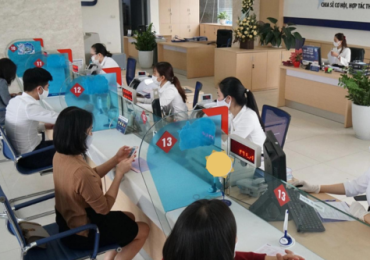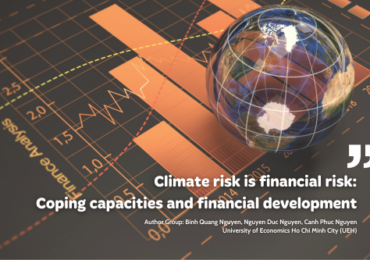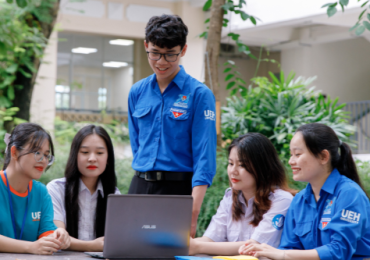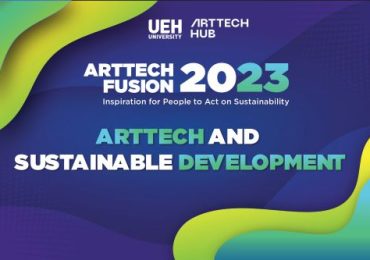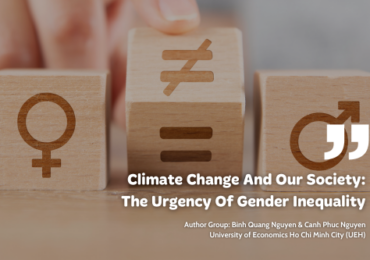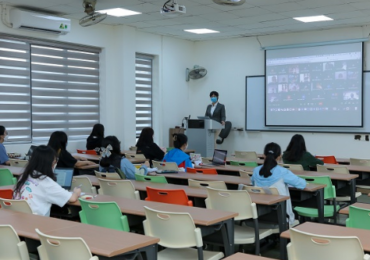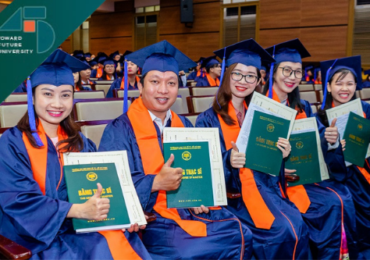[Podcast] Sustainable University Model For Emerging Markets
19 July, 2024
Keywords: Sustainable university, developing country, emerging market, sustainability, transformation model
Today, the sustainable university model plays an important role in developing countries; in contrast, many difficulties in the implementation phase are available due to the limited autonomy and specific social factors. This research by a group of authors from Ho Chi Minh City University of Economics (UEH) was conducted to explore sustainable university models from two aspects of approach and implementation as well as to present their strengths and weaknesses. From this background, a specifically designed model combined with application methods for universities in these countries is to be proposed.

Literature review
Although the United Nations Sustainable Development Goals have been widely applied worldwide, the implementation in developing countries has been facing numerous challenges due to their diverse contexts in each country. A variety of major challenges are posed, listed as poverty, inequality and pollution, all of which require an increase in education and research to promote sustainable development. To be illustrated, Universities – with an important role in training future generations of leaders – need to integrate education on sustainable development at all levels.
Various lessons have been demonsstrated regarding applying the sustainable university model in universities in Eastern and Central Europe: they focus on teaching and research besides emphasizing management, learning and cooperation. Omn the other hand, a unified development strategy cannot be applied to all sustainable universities; therefore, there is a need for separate models and methods appropriate to each country’s context. Therefore, an important research question that continuously attracts university managers is to determine the optimal sustainable university approach, transformation and implementation model suitable for the needs of universities in the context of emerging markets and developing countries. This study aims to identify the most effective strategies with the purpose of ensuring long-term environmental, social and economic sustainability for universities in developing countries.
Up to the present time, different models have been being applied on how to approach and to implement a sustainable university. Among them, 07 popular models include the following: (1) Management-oriented model (Managerial Model), (2) Transitional model (Transitional Model), (3) Community model (Community Model), (4) research-centered model (Research Centric Model), (5) Green university system (Green University System), (6) UNEP Sustainable University Implementation framework (UNEP Framework) and (7) (Sustainable University Excellence). In short, the first five models mainly take a top-down approach and emphasize sustainable integration into the core functions of a university whereas the final two models emphasize both deployment framework.
Higher education in emerging markets
The current emerging market landscape is comprised of two main types of universities. First is the high-end public universities that are closely related to the region’s progress. Second is young startup universities that apply a privatized operating structure. Regardless of the university, “Education” and “Research” play an integral, symbolic role recognized by academic and community organizations, ensuring the nurturing of a successful workforce in those emerging economies and developing countries. Therefore, the challenge lies in how these universities can effectively be transformed into a sustainable university model while being emphasizing the core values “Education” and “Research”. Therefore, upon developing the approaches and the models for sustainable university implementation in these emerging economies and developing countries, the following essential characteristics should be carefully considered:
- This approach must be dependent upon the theory and consistent with practical considerations;
- Emphasizing the transition from a traditional university to a sustainable university;
- Integrating the harmonious sustainable development principles into the basic and extended functions of the university without changing the inherent operational structure of the university;
- Implementing the framework with a long-term vision, allowing for continuous improvement and adapting the most appropriate strategies for each stage of the university’s development.
Research methods
The study, following the three-step analytical framework developed by Levy and Ellis, used narrative review, a popular qualitative research method, including the following factors: searching and screening documents, extracting and analyzing data, and writing a literature review. This approach effectively synthesizes a selective body of literature in this special field, providing the detailed information on the relevant topics and issues.
Models proposed for sustainable university strategy in the developing countries
From the research method, the authors have proposed a model that combines approaches and implementation techniques like a system transformation, including the following 05 typical pillars: Education, Research, Development Campus Sustainability, Community and Governance. The Governance pillar takes on the driving forces, the Campus Sustainability pillar is a central aspect of the overarching model, acting as o ne key pillar connecting diverse key functions, including Education, Research and Community. Besides, the proposed model tries to overcome the limitations of the “Research-centered” model and the “Community” model by using the Plan – Do – Check – Act method. PDCA (Plan – Do – Check – Act) is an implementation principle in the process of planning, organizing, evaluating and implementing plans and initiatives.

To implement this proposed model, universities need to consider implementing the following 03 factors:
(1) Continuous strategic improvement with PDCA principles;
(2) Applying of the Living Lab model – a tool to ensure the connection of the 5 pillars of the sustainable university model;
(3) Building the “Solidarity” culture among individuals, increasing understanding and consensus in implementing the university’s common goals.
Generally speaking, the proposed model emphasizes the importance of sustainability on campus as a convergence point for the remaining four functions: Education, Research, Community and Administration. At the same time, the study supports the integration of training and research focused on sustainability that contributes to achieving the 17 SDGs. Furthermore, the study contributes to enriching the theoretical foundation for implementing a sustainable university and is one of the pioneering studies in exploring the context of emerging and developing countries in the period of conversion period.
Please refer to the full article titled Sustainable university model for emerging markets HERE
Author group: Assoc.Prof. Bui Quang Hung, Dr. Trinh Tu Anh, MBA. Le Thi Hanh An, MSc. Nguyen Dinh Hoang Uyen – University of Economics Ho Chi Minh City (UEH), MSc. Phan Nhu Quynh – Vietnam Aviation Academy.
This is an article in a series of articles spreading research and applied knowledge from UEH with the message “Research Contribution For All – Research For The Community”, UEH respectfully invites readers to read the upcoming UEH Research Insights #120.
News, photos: Sustainable University Project Committee, UEH Department of Marketing and Communications

[Podcast] Digital Leadership – An Overview from the Digital Age
25 February, 2025
[Podcast] Assessing the potential of wind energy exploitation in Vietnam
20 February, 2025
[Podcast] Recommendations for University education development
14 February, 2025
[Podcast] Developing Vung Tau into a World-Class Tourism City
16 January, 2025
[Podcast] Postdigital Design Strategies for Media Art
6 January, 2025
[Podcast] NFTs – Artistic Innovation or Just a New Hype?
27 December, 2024
[Podcast] Boosting Employee Creativity with Constructive Feedback
23 November, 2024
[Podcast] “Dutch Disease” in Remittances and the Case of Vietnam
4 November, 2024
[Podcast] Latest approaches for sustainable universities
11 July, 2024
Data Law – Part 1: Necessity for a New Approach
18 May, 2024
Advertising Evaluation on Tiktok Platform
14 May, 2024
[Podcast] Advertising Evaluation on Tiktok Platform
13 May, 2024
Promoting Learner Autonomy in English Language Learning (Part 1)
24 November, 2023
ArtTech And Sustainable Development
27 October, 2023
Motivation of EFL Vietnamese Students in Economics-related Majors
12 October, 2023
Climate Change And Our Society: The Urgency Of Gender Inequality
12 October, 2023
People Analytics in Vietnam
10 March, 2022
Revolution in Experimental Economics
30 January, 2022
The Sharing Economy: Governance Issues in Vietnam
24 January, 2022
Employment Policy For Ho Chi Minh City in Post-social distancing Period
28 December, 2021
Lifelong learning at UEH: Towards a Sustainable University
28 December, 2021
Building a Decentralized Stock Market based on Blockchain Technology
24 December, 2021
Consumer price index from big data mining perspective (Big data)
17 November, 2021
Overview Of Digital Currency – Part 5: DIEM Private Stabilized Currency
11 November, 2021






















































































































